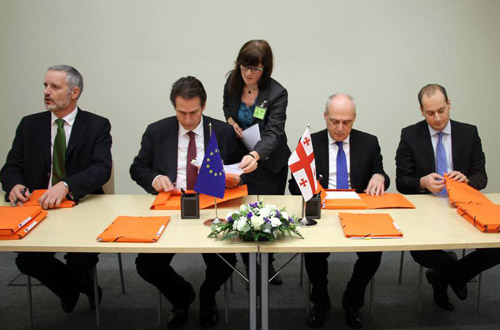| Georgia, EU Initial Association Agreement |
| Civil Georgia, Tbilisi / 28 Nov.'13 / 18:35 |

From left to right: Philippe Cuisson, chief negotiator on DCFTA from the European Commission’s directorate general for trade; Gunnar Wiegand, director of Russia, Eastern Partnership, Central Asia and Regional Cooperation at EU’s external relations service; Georgia’s First Deputy Foreign Minister Davit Zalkaliani and Georgia’s Deputy Economy Minister Mikheil Janelidze initial AA/DCFTA between Georgia and the EU in Vilnius, November 28, 2013. Photo: Georgian MFA
Georgia’s Association Agreement (AA) with the EU, also including deep and comprehensive free trade treaty (DCFTA), was technically initialed in Vilnius on November 28 on the first day of the Eastern Partnership summit.
A formal ceremony of initialing of 1,000-page AA/DCFTA will take place on the second day of the summit, November 29, with participation of Georgian Foreign Minister Maia Panjikidze and Economy Minister Giorgi Kvirikashvili, as well as EU foreign policy chief Catherine Ashton and EU Trade Commissioner Karel De Gucht.
Georgian leadership says its “ambitious goal” is to have AA/DCFTA signed by September, 2014.
After the Vilnius summit foreign ministers from the EU member states will outline several key areas and then the European Commission will develop concrete benchmarks in each of those areas based on which the EU will be monitoring performance of Georgia to assess eligibility to sign the Association Agreement.
After the agreement is signed, it will then require ratification by legislative bodies of the EU-member states, as well as by the European Parliament.
Before ratification “provisional application” of some parts of the DCFTA will start; those parts of the agreement include regulations related to phytosanitary, intellectual property rights, competition policy, as well as some parts of the agreement related to sectoral cooperation.
Georgian Foreign Minister, Maia Panjikidze, says initialing of the AA/DCFTA is a “historic moment for my nation”, which seals the country’s European choice.
“Next year, when we enter the implementation phase of our commitments, will be significant for ensuring the irreversibility of Georgia’s European perspective,” she wrote in an opinion piece published by Brussels-based EUobserver.com.
Summit in Vilnius is the third one since EU launched Eastern Partnership initiative in 2009.
President Giorgi Margvelashvili arrived in Vilnius to participate in the summit on November 28.
This is his first foreign trip after taking the office following the October 27 presidential election.
“We are taking step which will bring us closer to the EU and ensure irreversibility of our European course,” Margvelashvili said in Vilnius.
During the Vilnius Summit, Georgia and EU will sign a framework agreement on Georgia’s participation in EU’s crisis management operations.
According to the Georgian Foreign Ministry, the EU invited Tbilisi to offer its contribution to EU’s civilian mission in the Horn of Africa and West Indian Ocean, EUCAP NESTOR, as well as in EU’s military training mission in Mali (EUTM Mali) and EU Border Assistance Mission (EUBAM) in Libya.
The summit in Vilnius gathers heads of governments and high ranking officials from the EU-member states and six Eastern Partnership members.
Among the participants are German Chancellor Angela Merkel, French President François Hollande and UK Prime Minister David Cameron, as well as Presidents of Latvia, Poland, Cyprus, Romania and Slovakia; Prime Ministers of the Czech Republic, Denmark, Estonia, Greece, Italy, Croatia, Luxembourg, Malta, the Netherlands, Portugal, Slovenia, Sweden, Hungary and Spain.
Presidents of Armenia, Azerbaijan, Georgia and Ukraine, as well as Moldovan Prime Minister and Belarusian Foreign Minister will be representing Eastern Partnership countries.
European Council President Herman Van Rompuy, European Commission President José Manuel Barroso, European Parliament President Martin Schulz, EU foreign policy chief Catherine Ashton, Commissioner for Enlargement and European Neighbourhood Policy Štefan Füle and Commissioner for Trade Karel De Gucht are also participating.
